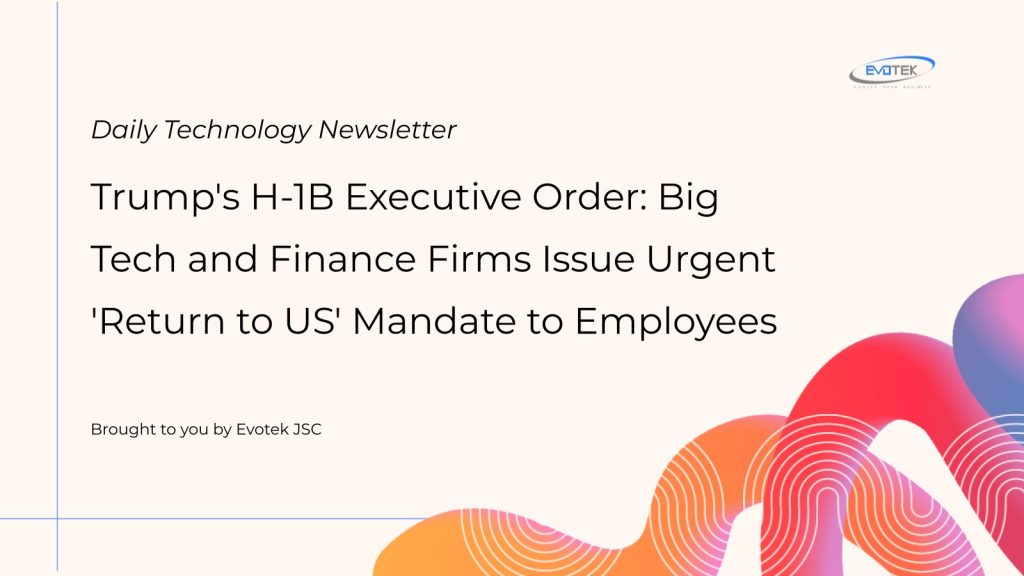A sudden executive order signed by President Donald Trump is causing significant upheaval across the US tech and finance industries, prompting major corporations to issue urgent directives to their H-1B visa-holding employees. Companies like Amazon, Microsoft, JPMorgan Chase, and Meta are advising staff on H-1B visas to immediately return to the United States or refrain from international travel, effective before a critical deadline.
The executive order, signed on Friday, introduces an unprecedented $100,000 fee for each H-1B application. This significant cost increase, which takes effect at 12:01 a.m. ET on September 21, could effectively bar H-1B visa holders from reentering the country if they are traveling abroad, unless their sponsoring employer covers the steep new charge. Crucially, it remains unclear whether this applies only to new applications or also to visa renewals, adding to the widespread anxiety.
Companies Scramble to Issue Immediate Guidance
Internal communications, reviewed by Business Insider, reveal the frantic efforts by leading companies to navigate this sudden policy change:
- Amazon: Just hours after the order was signed, Amazon’s HR portal updated with a stark advisory. Employees currently in the US on H-1B status were told to “Stay in the country for now, even if you have travel planned for the immediate future.” For those with H-1B or H-4 status outside the US, the guidance urged them to “Try to return before tomorrow’s deadline if possible,” adding that those unable to make it back should “avoid attempting US reentry until further guidance is provided.” Amazon employed nearly 15,000 H-1B workers in fiscal year 2024.
- Microsoft: Similar directives were issued to Microsoft employees. An internal advisory shared by multiple staff members urged visa holders in the US to remain “for the foreseeable future” and encouraged those abroad to “do your best to return” before the deadline. The memo acknowledged the disruption: “We know this may interrupt your travel plans. But the critical thing is to stay in the US in order to avoid being denied reentry.”
- JPMorgan Chase and Meta: Employees at these financial and tech giants also received comparable instructions, highlighting the widespread impact of the order. JPMorgan Chase notably sponsored almost 2,000 H-1B visas last year, many for software professionals, making it a significant player in the financial sector’s H-1B landscape.
Representatives for Amazon, Microsoft, Meta, and JPMorgan Chase have not yet provided official comments on the situation.
Massive Disruption for US Tech Sector
This rapid policy implementation poses a colossal challenge for the US tech sector, which heavily relies on the H-1B visa program to attract highly skilled engineers, developers, and other specialized professionals from around the globe. Big Tech companies, including Amazon, Microsoft, Google’s parent Alphabet, Meta, and Apple, are among the top sponsors of these visas, utilizing them to fill critical technical roles amid fierce competition for talent.
Administration officials have justified the new fee, stating its intent is to ensure that only “very valuable” foreign workers are retained in the US and to encourage companies to invest more in training American workers. “Either the person is very valuable to the company and America, or they’re going to depart and the company is going to hire an American,” Commerce Secretary Howard Lutnick commented during the announcement.
The H-1B visa program has been a long-standing point of contention, with varying opinions even among those close to the administration. Tech leaders like Elon Musk have expressed support for the program, while other Trump supporters advocate for stricter immigration policies. President Trump himself has previously offered mixed signals on H-1B visas, once stating, “I have always liked the visas… I’ve been a believer in H-1B. I have used it many times. It’s a great program.”
The immediate consequence is a period of intense uncertainty and logistical challenges for thousands of H-1B visa holders and their employers across the United States.

 日本語
日本語 한국어
한국어 Tiếng Việt
Tiếng Việt 简体中文
简体中文